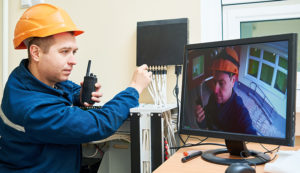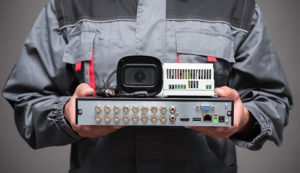HOA security cameras can help give residents peace of mind, but they can also be a source of conflict in the community. Thus, it is important to understand the legalities and intricacies of installing such cameras, whether you are a part of the HOA board or just a regular member.
Are HOA Security Cameras Allowed?
One of the most common questions about security cameras in HOA communities is whether or not they are even legal or allowed. Generally speaking, HOA security cameras are allowed, particularly when it comes to security cameras in common areas. These cameras, though, should not be pointed towards areas where residents expect reasonable privacy such as bathrooms, locker rooms, and the inside of an owner’s home. Additionally, while you can install cameras for video surveillance, audio surveillance is usually illegal.
As an HOA board member, it is imperative that you first check federal, state, and local laws relating to video cameras in HOAs. Not all states or cities have the same ordinances, and what might be legal for an HOA in one area may not be entirely legal in yours. Before jumping into anything, it is best to first ask your HOA manager or HOA attorney for advice.
In addition, you must check your governing documents for any policies concerning HOA surveillance cameras. Such provisions usually pertain to the installation of security cameras, how footage must be stored, and how long they must be stored before deleting. It is worth noting, though, that some associations — particularly older ones — lack any provisions concerning security cameras in their governing documents. If that is the case with your community as well, consider amending your bylaws or CC&Rs to include HOA rules regarding security cameras.
Can HOA Deny Security Cameras on Private Property?
 Typically, homeowners associations reserve the sole authority to install security cameras in common areas. Homeowners themselves usually cannot do so in such places, though there have been rare exceptions in the past. But, what about individual properties? Can I install cameras in my condo or house?
Typically, homeowners associations reserve the sole authority to install security cameras in common areas. Homeowners themselves usually cannot do so in such places, though there have been rare exceptions in the past. But, what about individual properties? Can I install cameras in my condo or house?
In general, homeowners do have the right to install home or condo security cameras on their own property or unit. But, reasonable expectation of privacy also applies here. That means owners must not point their cameras at their neighbors’ windows, backyards, or any other areas where privacy is expected. Additionally, the cameras must not cause any nuisances nor interfere with other owners’ right to quiet enjoyment.
Furthermore, homeowners must still abide by the association’s rules on HOA security cameras. If the installation of such cameras is considered an architectural modification, owners will normally need to seek approval from the board or ARC first.
Creating an HOA Security Camera Policy
Homeowners associations maintain order and structure within their communities with the help of policies and rules. As such, it only makes sense to craft an HOA or condominium security camera policy that your association and its members can follow. While no two associations are identical, there are a few common points that every HOA video surveillance policy should have.
Aesthetics
The entire purpose of a homeowners association is to keep the community looking great, thus, maintaining or improving property values. Security cameras, stylish as some may be, can have a negative impact on the appearance of your neighborhood.
If you want to maintain the aesthetics of your community, require cameras that align with the overall look of the association. This goes for both security cameras in common areas and in individual owners’ properties. In addition, you should take weather changes into account. Outdoor cameras must be constructed out of durable materials so that they stand up to even the most severe weather conditions.
Placement
 HOA security camera privacy is a huge concern for many homeowners. Keep in mind that every member has a right to a reasonable expectation of privacy. Thus, your HOA must make sure to regulate the placement of cameras as well — whether these are in common areas or individual owners’ properties. HOA security cameras must be installed in such a way that they don’t interfere with member privacy.
HOA security camera privacy is a huge concern for many homeowners. Keep in mind that every member has a right to a reasonable expectation of privacy. Thus, your HOA must make sure to regulate the placement of cameras as well — whether these are in common areas or individual owners’ properties. HOA security cameras must be installed in such a way that they don’t interfere with member privacy.
Footage Management
One of the most overlooked aspects of a good security camera policy is footage management. Once the cameras are installed, what will the association do with the footage? Will someone monitor the footage 24/7 or simply review them after recording? Who and how often will they do that?
If the association won’t assign anyone to monitor the footage all the time, it is important to install cameras with accompanying signs stating that no one is manning the cameras 24/7. This will help protect the HOA from potential liability.
When footage is recorded, the association should also restrict access. Only certain people should be allowed to view the footage. If an owner requests a copy of the footage, they must issue a subpoena first. Make sure this part of the policy is clear to all homeowners.
Lastly, you might have a lot of space now, but storage problems will eventually crop up once you accumulate a lot of footage. You will eventually need to delete old footage, so decide how long you should keep videos before deleting them.
Dummy Cameras, Signs, and Budget Considerations
Security cameras cost money, and the ones with sophisticated features tend to be more expensive. If your HOA is planning to install security cameras any time soon, make sure to allocate some room in your budget for them. In addition to installation fees and the cost of the cameras themselves, you also need to factor in other regular expenses such as maintenance fees, storage, and upgrades. If your community is growing, you might also have to add more cameras.
Because of financial obligations attached to HOA security cameras, many associations opt to install dummy cameras instead. Dummy cameras look like security cameras, but they don’t actually record anything. Since the primary purpose of security cameras is to deter crime, the presence of cameras — while fake — may be enough to accomplish just that.
The problem with dummy cameras, though, is that they pose liability risks. When an actual crime does take place, residents might mistakenly think the nearby camera recorded the incident when, in fact, it did not. Additionally, dummy cameras should still adhere to privacy laws. Should you install dummy cameras, make sure residents know they are fake. Generally, though, it is better to go with the real ones.
When it comes to signs alerting people to the presence of cameras, homeowners associations are not legally required to post them. But, an obvious benefit to posting such signs is that they can boost the effect of cameras on discouraging criminal activity. Whether or not your association decides to post signs, though, see to it that all homeowners are aware of the positions of security cameras.HOA security cameras often utilize IP cameras, which are AI-powered and offer remote access and video analytics.
For Help With Security Cameras
 Navigating the ins and outs of HOA security cameras can be confusing, especially since the subject privacy is involved. Installing and regulating security cameras, though, is ultimately a balancing act. And an excellent security camera policy will help your HOA stay on the good side of both the law and its residents.
Navigating the ins and outs of HOA security cameras can be confusing, especially since the subject privacy is involved. Installing and regulating security cameras, though, is ultimately a balancing act. And an excellent security camera policy will help your HOA stay on the good side of both the law and its residents.
If you need help with the legality of security cameras and other HOA matters, call Cedar Management Group. Our HOA management company offers legal assistance in addition to community management, accounting, board education, and other services. Call us today at (877) 252-3327 or contact us online to request a free proposal.
RELATED ARTICLES:
- Homeowners Rights Against HOA: Avoiding Conflict In The Community
- What’s The Real Deal About Police Vehicles In An HOA Community?
- 5 Tips To Help You Make Your HOA Drone Policy






